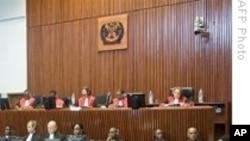The Special Court for Sierra Leone, established to try rebel leaders for atrocities committed during the country's brutal civil war, handed down its last judgment Monday.
A decade has passed since Sierra Leone put an end to its brutal civil war and embarked on the long road to reconciliation and justice.
As part of that process Sierra Leone's Special Court upheld the convictions of three rebel leaders accused of war crimes. The appeal ruling is the court's final word on atrocities committed during 11 years of civil war.
Patrick Fatoma is outreach coordinator for the Special Court. He says the ruling is a milestone for the people of Sierra Leone.
"For Sierra Leone this is a landmark decision," said Fatoma. "For the first time in the sub-region, people have been assigned responsibility for mass murder and serious crimes committed against the people in their own country."
Fatoma says victims of the war in Sierra Leone can now breathe a sigh of relief to see the case come to an end.
During the war, tens of thousands of civilians died and rebels mutilated many people who had their arms, legs, noses and ears cut off. Women were raped and forced to become 'bush wives' to rebel fighters and thousands of children abducted, drugged and forced to fight as soldiers.
The Special Court for Sierra Leone was established in 2002 by the government of Sierra Leone and the United Nations to prosecute those who bore the "greatest responsibility" for atrocities committed during the war.
Prosecutors brought a case against the three surviving leaders of the rebel group, the Revolutionary United Front. In February, the Special Court found Issa Sisay, Augustine Gbao and Morris Kallon guilty on several counts including murder, attacks against U.N. troops, sexual slavery and recruitment of child soldiers.
Sisay was sentenced to 52 years in prison, the longest sentence given by the court. Kallon was given a 40-year sentence and Gbao, who was acquitted of the sexual slavery charge, received a 25-years sentence.
The defendants appealed 91 of the guilty verdicts. But the Special Court's final decision upheld the convictions and original sentences.
The decision marks the end of a decade-long struggle to bring to justice the worst perpetrators of war crimes in Sierra Leone.
The Special Court's only ongoing case is the trial of former president of Liberia Charles Taylor in the Hague.
News
Sierra Leone War Crimes Tribunal Makes Final Ruling
update

<!-- IMAGE -->






